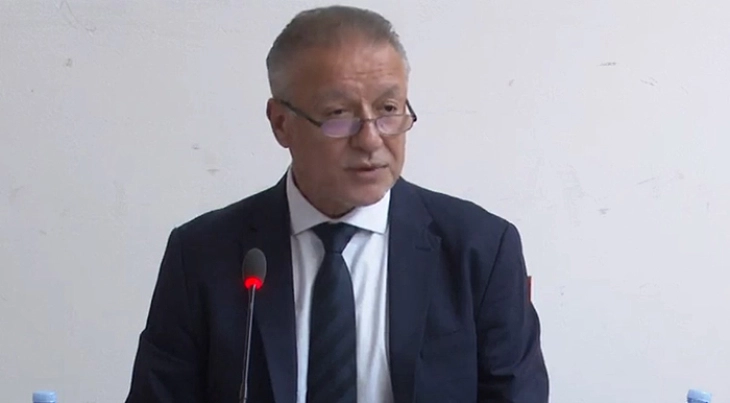Crvenkovski: Western Balkan countries to request gradual integration before full-fledged EU membership
- All Western Balkan countries, without exceptions, should together request from the EU access to the common European market and to the Union’s structural funds. Not as an alternative to full-fledged membership, but as a step that will further prepare us for full integration, said former President Branko Crvenkovski at the “Western Balkans’ Integration into the EU – Challenges and Perspectives” regional conference organized Saturday in Skopje by the Podgorica Club and the Universal Peace Federation.
- Post By Angel Dimoski
- 13:52, 14 October, 2023

Skopje, 14 October 2023 (MIA) – All Western Balkan countries, without exceptions, should together request from the EU access to the common European market and to the Union’s structural funds. Not as an alternative to full-fledged membership, but as a step that will further prepare us for full integration, said former President Branko Crvenkovski at the “Western Balkans’ Integration into the EU – Challenges and Perspectives” regional conference organized Saturday in Skopje by the Podgorica Club and the Universal Peace Federation.
Crvenkovski stressed that it is important for the Western Balkan countries to fulfill the tasks that depend only on them – to implement the necessary reforms, while there are limiting factors in the Euro-integration and EU decisions require unanimous consensus.
“When it comes to things that depend only on centers within the EU,” said Crvenkovski, “the Western Balkan countries have two options – to remain passive and wait, or to show initiative and to help the EU define its new approach towards the Western Balkans.”
In terms of 2030 as a possible date for the next enlargement of the Union, Crvenkovski said it should be supplemented with “as long as the Union manages to reform and prepare itself for enlargement by then.”
The former President characterized the Euro-integration of the Western Balkans as “unacceptably slow, completely halting at times and with no steps forward whatsoever”. Speaking specifically about North Macedonia, Crvenkovski said a lot of the faults lie in the country’s own weaknesses such as “the unacceptably high level of corruption and various types of organized crime; inefficient judiciary – corrupt and susceptible to political influence; partisan and inefficient administration; adopted EU laws which are being implemented in a ‘Balkan way’; reforms which are either prolonged or aren’t being implemented completely.”
“The EU is declaratively committed to enlargement,” added Crvenkovski, “but in reality it isn’t ready for it.”
“The principle of making decisions by consensus prevents it [the EU] from being able to decide and act quickly and efficiently. It leads to frequent blockades, and the process of looking for a compromise acceptable to all sides results in partial solutions,” said the former President.
In terms of North Macedonia’s EU integration, Crvenkovski pointed to the “painful concessions” regarding the name change. “Despite that, apart from NATO membership, we didn’t get a date for the beginning of EU negotiations because of the bilateral dispute with Bulgaria over issues which have nothing to do with the Copenhagen Criteria,” he said.
“Our national identity and historical continuity are being disputed. In Macedonia’s case all possible precedents were made, and the EU was completely unprincipled when it came to respecting the basic values upon which it, itself, is founded,” said Crvenkovski.
Photo: MIA Archive







